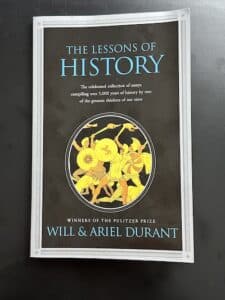The Lessons of History by Will and Ariel Durant
Reading Time: 3 minutes
Summary
A concise, thematic account of history that covers the core biological, social, economic, and philosophical lessons of history. The Durants introduce you to everything from the 3 fundamental biological lessons of life to the origins of racial antipathies.
Buy this book on Amazon (Highly recommend)
Key Takeaways
Life is competition
“So the first biological lesson of history is that life is competition. Competition is not only the life of trade, it is the trade of life—peaceful when food abounds, violent when the mouths outrun the food.”
Life is a competition for resources, and where our basic needs aren’t met, it is no surprise that violence or unthinkable acts happen.
Life is selection
“The second biological lesson of history is that life is selection. In the competition for food or mates or power some organisms succeed and some fail. In the struggle for existence some individuals are better equipped than others to meet the tests of survival.”
Life is not inherently fair. Some people are better equipped to deal with the realities of life than others, and this reality plays out in our world each day.
Life is breeding.
“The third biological lesson of history is that life must breed. Nature has no use for organisms, variations, or groups that cannot reproduce abundantly.”
Life exists and endures to produce more life.
Freedom is inversely related to equality
“Nature smiles at the union of freedom and equality in our utopias. For freedom and equality are sworn and everlasting enemies, and when one prevails the other dies.”
If we want both unlimited freedom and complete equality, we’re bound to be disappointed. Increased freedom often brings decrease equality. The relationship between freedom and equality is rarely recognized in our world.
Some things just stay the same
“Means and instrumentalities change; motives and ends remain the same: to act or rest, to acquire or give, to fight or retreat, to seek association or privacy, to mate or reject, to offer or resent parental care.”
Life changes in some ways, but not in others. At every period of history, the same motives and ends fill our day to day existence.
Evolution
“Evolution in man during recorded time has been social rather than biological: it has proceeded not by heritable variations in the species, but mostly by economic, political, intellectual, and moral innovation transmitted to individuals and generations by imitation, custom, or education.”
We have experienced a social evolution, but few things have changed biologically. I often think about this when wondering how well we’re equipped to deal with the fast-paced and technologically driven world that we now live in.
The balance created by the old and the young
“It is good that the old should resist the young, and that the young should prod the old; out of this tension, as out of the strife of the sexes and the classes, comes a creative tensile strength, a stimulated development, a secret and basic unity and movement of the whole.”
Differences in age, sex, and class create a natural and necessary tension that helps us all move more as a unit. This idea comes to mind when I speak with old or young people and hear some of the common arguments, “life used to be so much better” and “look at the awesome future we’re building.”
On inequalities in wealth
“We conclude that the concentration of wealth is natural and inevitable, and is periodically alleviated by violent or peaceable partial redistribution. In this view all economic history is the slow heartbeat of the social organism, a vast systole and diastole of concentrating wealth and compulsive recirculation.”
The concentration of wealth is nothing new in history. It’s an endless cycle that ebbs and flows. Once the wealth becomes too concentrated, in one way or another, it is eventually redistributed.
The purpose of education
“Consider education not as the painful accumulation of facts and dates and reigns, nor merely the necessary preparation of the individual to earn his keep in the world, but as the transmission of our mental, moral, technical, and aesthetic heritage as fully as possible to as many as possible, for the enlargement of man’s understanding, control, embellishment, and enjoyment of life.”
Education is about passing along what we know and have been learning for thousands of years so that we can continue improving our understanding, development, and enjoyment of life.
🙈 That's all for now! If you enjoyed this piece...
📚 If you want to discover more great books...
Explore the best books for expanding your mind, the best self-help books, the best philosophy books for beginners, books for people who don't enjoy reading, and more great books.


